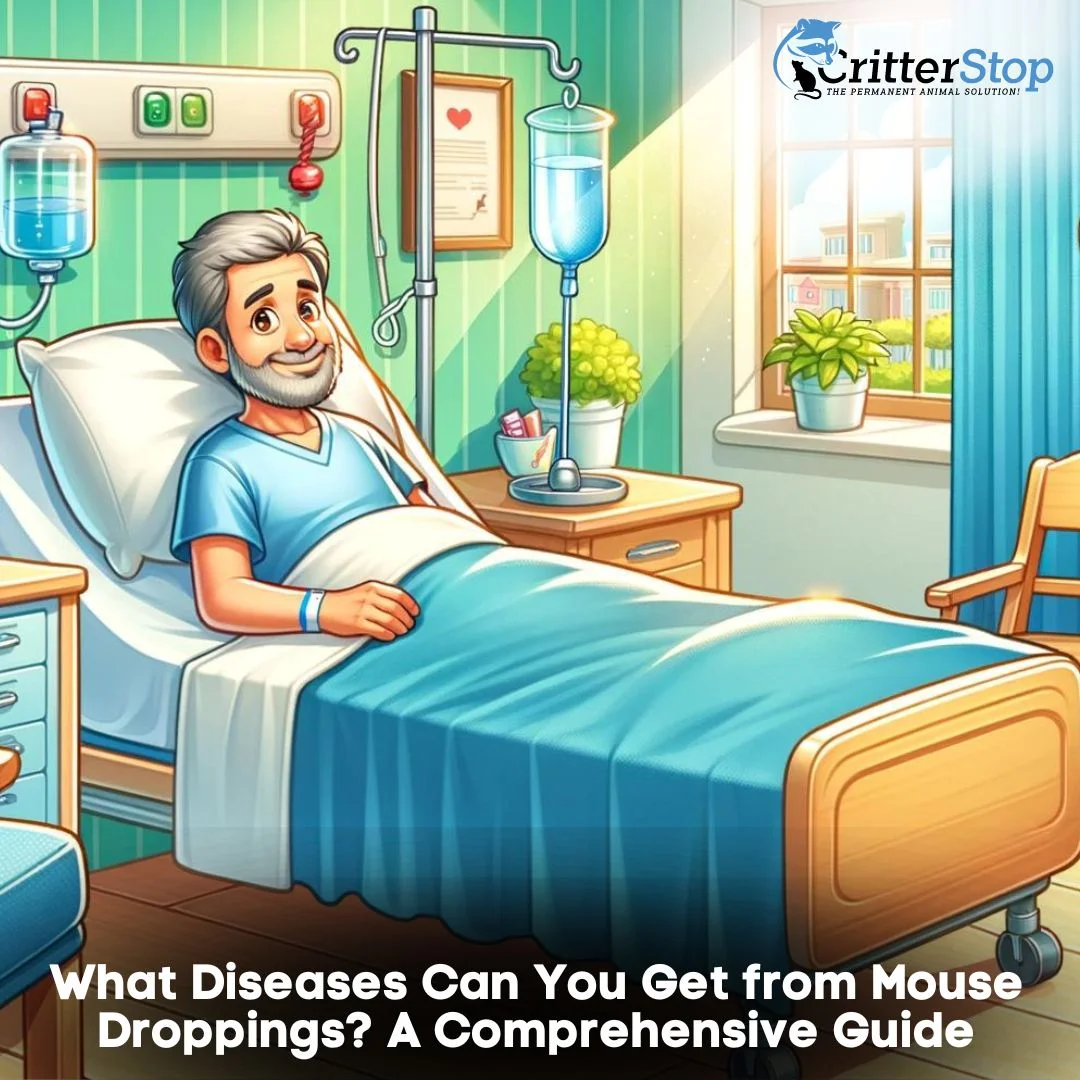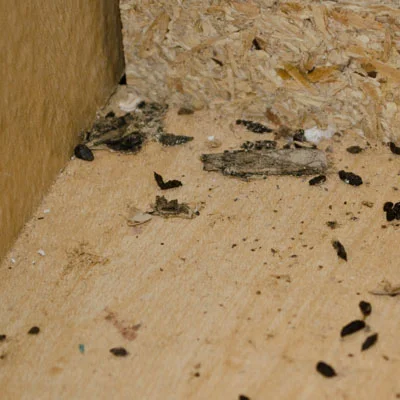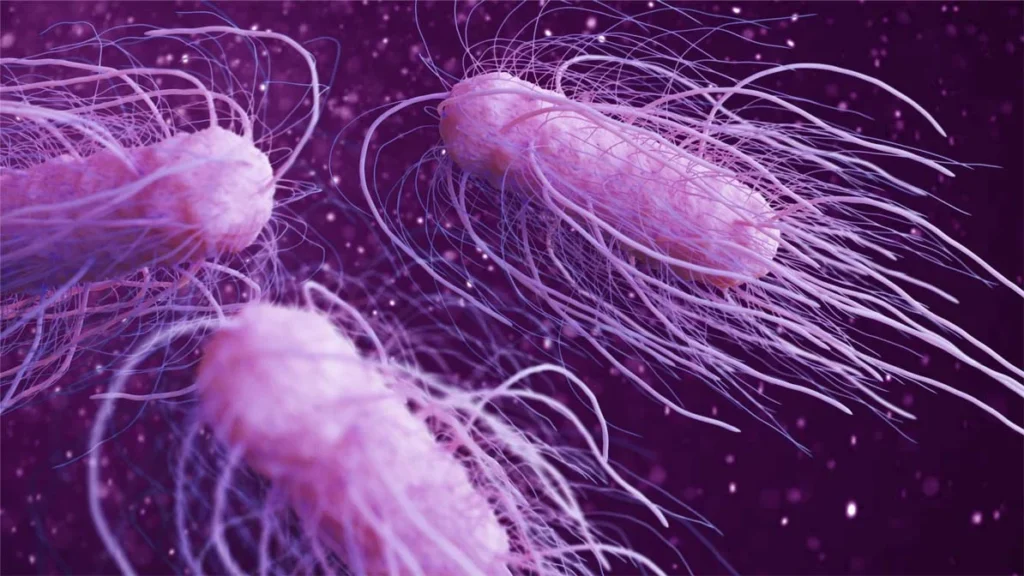
Mouse droppings can be a common sight in households, especially during the fall and winter seasons, since mice look for shelter from the outdoors. While it may seem harmless to clean up the droppings and move on, it's important to know that they can carry a variety of diseases. In fact, mouse droppings are a known source of several illnesses that can affect humans.
One such disease is Hantavirus Pulmonary Syndrome (HPS), which is caused by a virus found in the urine, feces, and saliva of infected rodents. When humans come into contact with contaminated materials, such as mouse droppings, they can contract the virus. HPS can cause flu-like symptoms, including fever, muscle aches, and fatigue, and can progress to severe respiratory distress and even death. While HPS is rare, it's important to take precautions when cleaning up mouse droppings to prevent its spread, because this is one of the most important mouse feces diseases.

Another disease that you can get from getting in contact with droppings is Salmonellosis, caused by a bacterium called “genus Salmonella”. This is caused by a type of bacteria found in the feces of infected animals, including mice. This can happen when you ingest any type of food or water that has been contaminated with the bacteria, they can experience symptoms such as diarrhea, fever, and abdominal cramps. It can be treated and you can recover from it normally, but if the case is severe it can be life-threatening, especially in young children, elderly individuals, and those with weakened immune systems.

Mouse droppings can be a source of a plethora of diseases that can be transmitted to humans and pets. These diseases can be caused by bacteria, viruses, or parasites present in the droppings.
Some of the diseases that can be transmitted from mouse droppings include:
Symptoms of these diseases can vary depending on the disease and the individual affected. Common symptoms include fever, pain, headache, nausea, vomiting, cough, and loss of appetite.
Hantavirus Pulmonary Syndrome (HPS) is a severe respiratory disease caused by the Hantavirus. Symptoms of HPS can include fever, muscle aches, cough, and shortness of breath. In very serious and life threatening cases, HPS can be the cause of respiratory failure and death.
Leptospirosis is a bacterial disease that can cause flu-like symptoms, like: fever, headache, muscle aches, and others. On occasions it can get complicated and lead to kidney damage, liver failure, and meningitis.
Salmonellosis is a bacterial infection caused by the Salmonella bacteria. Some symptoms can be diarrhea, fevers, abdominal cramps and when dealing with severe cases it can cause dehydration and hospitalization.
Lymphocytic Choriomeningitis (LCM) is a viral disease that can cause flu-like symptoms such as fever, headache, and muscle aches. In serious and more severe cases it can lead to meningitis and encephalitis.
Rat-Bite Fever is a bacterial disease that can cause fever, chills, headache, and muscle aches. Severe cases include the symptoms of joint pain, rash, and even death.
It is important to take precautions when cleaning up mouse droppings to prevent the transmission of these diseases. Use gloves, masks, and disinfectants to clean up droppings and avoid breathing in dust or particles from the droppings.
Mouse droppings can be a source of various diseases that can be transmitted to humans. It is important to take necessary precautions while cleaning up mouse droppings to avoid contact with the contaminated material.
Salmonellosis is a form of food poisoning caused by the bacteria of Salmonella. Mice can carry this bacteria in their feces, and it can spread to humans through contaminated food or water. Some of the symptoms of salmonellosis include diarrhea, fevers and abdominal cramps.
Leptospirosis is a form of bacterial infection that can be transmitted to humans and other pets by coming in contact with contaminated urine of infected animals, including mice. Some of the symptoms that leptospirosis may cause are fevers, headaches, muscle aches and vomiting.
Hantavirus Pulmonary Syndrome (HPS) is a rare but serious respiratory disease caused by the hantavirus. The virus can be transmitted to humans through contact with urine, droppings, saliva of any infected type of rodent like mice and rats. Some symptoms caused by HPS are fever, muscle aches, cough and shortness of breath.
Lymphocytic Choriomeningitis (LCM) is a viral infection transmitted to humans when they come in contact with urine, droppings, or saliva of infected rodents, including mice. Symptoms of LCM include fever, headache, muscle aches, and nausea.
It is important to note that not all mice carry these diseases, and the risk of infection can vary depending on the level of contact with contaminated material. It is recommended to wear gloves and a mask while cleaning up mouse droppings and to properly dispose of the contaminated material to avoid the spread of disease.

Mouse droppings can carry various diseases that can be transmitted to humans through contact or inhalation. In the next part of the blog, you can find some of the most common disease caused by mouse droppings and their symptoms.
Salmonellosis is a bacterial infection that is commonly transmitted through consuming contaminated food or water. Keep in mind also, that having contact with mouse droppings can cause Salmonellosis. Symptoms of salmonellosis include diarrhea, fever, and abdominal cramps. In more severe and serious cases, the infection can spread to your bloodstream and cause more serious symptoms. If you fell sick with any of these symptoms, please call a doctor as soon as you can.
Leptospirosis is a bacterial infection transmitted through contact of contaminated water or soil, as well as through contact with infected animals such as mice. Some symptoms of leptospirosis can go from the mild range to a severe one, and cause fever, headache, muscle aches and vomiting, and when not treated and become more severe it can cause liver and kidney failure.
Hantavirus pulmonary syndrome (HPS) is a viral infection that can be transmitted through inhalation of mouse droppings or urine. Some symptoms that HPS can cause are fever, muscle aches, and coughing. As the disease progresses and infects more of your system it can lead into severe symptoms like shortness of breath and fluid accumulation in the lungs, which can be life-threatening.
Lymphocytic choriomeningitis (LCM) is a viral infection that is commonly transmitted through contact with mouse droppings or urine. Symptoms of LCM include fever, headache, muscle aches, and vomiting. In severe cases, the infection can cause meningitis or encephalitis.
Remember to seek medical attention immediately if you suspect that you have contracted any of these diseases from mouse droppings. Treatment may include antibiotics, antiviral medication, or supportive care to manage symptoms.
To prevent infestation, it is important to keep your home clean and free from any clutter and debris. Seal any small entrance like cracks on the floor or walls to prevent mice from entering your home. Prevention is key, if you suspect that you have a rat infestation at the moment, contact a pest control company to safely and effectively remove the rodents.
Preventing diseases transmitted from mouse droppings is crucial for maintaining good health. Here are some effective ways to prevent such diseases:
Mouse droppings should be cleaned up as soon as they are spotted. This will reduce the chance of coming in contact with the droppings and the diseases they may carry. Use gloves and a mask while cleaning up, and dispose of the droppings in a sealed bag.
Reducing the mouse population in and around the house is an effective way to prevent diseases transmitted from mouse droppings. Use mouse traps and seal any gaps or holes on your property to prevent mice from entering the house.
Practicing good hygiene is important to prevent the spread of diseases. As always wash your hands thoroughly with soap and water after handling mouse droppings, and avoid touching the face or mouth. Keep the house clean and free from clutter to reduce the chances of mice finding a place to live.
By following the steps on this guide, you can significantly reduce the risk of experiencing severe or serious illness caused by diseases transmitted from mouse droppings.
Mouse droppings pose a threat to humans and pets' health. Being known as a main carrier of a plethora of diseases like hantavirus, salmonellosis, and leptospirosis. Hantavirus is a particularly dangerous disease that can cause severe respiratory illness and even death.
Salmonellosis is another disease that can be transmitted by coming in contact with the mouse droppings. It is a type of food poisoning that can cause symptoms such as diarrhea, fever, and abdominal cramps.
Leptospirosis is a bacterial infection, mostly transmitted through contact with water contaminated with mouse urine. It can cause symptoms such as fever, headache, and muscle aches. The most severe cases, it can lead to liver damage and kidney failure.
Preventing contact with mouse droppings is the best way to avoid these diseases. This can be done by taking a few simple steps, such as:
It is important to note that mouse droppings should never be swept or vacuumed, as this can release harmful particles into the air. Instead, they should be soaked in a disinfectant and then carefully removed.
In conclusion, mouse droppings can be dangerous and should be treated with caution. Follow these strategies to prevent and reduce the risk of contracting these diseases and stay healthy.
We know that having rodents in your house, attic, or even your vehicle could become a big headache. This plague doesn’t respect anything in your house. They will chew your wires, leave droppings behind and, if they have the possibility, eat your food. Don’t let rodents disturb your space! Call us at (214) 234-2616 to get a professional rodent removal service. We have successfully serviced the area of the Dallas - Fort Worth metroplex hundreds of times before, delivering solutions to all our neighbors.
Exposure to mouse droppings can pose several health risks to humans. Since mice carry and transmit a variety of diseases through their droppings, urine, and saliva. Some of the diseases that can be caused by exposure to these animals are hantavirus, salmonellosis, leptospirosis, and lymphocytic choriomeningitis, among others.
The initial signs of infection from rodent-borne diseases can vary depending on the specific disease. However, common symptoms include fever, chills, muscle aches, headache, vomiting, and diarrhea. The severe cases can lead to respiratory failure, kidney failure, and even death.
Hantavirus is primarily transmitted to humans through exposure to the droppings, urine, or saliva of infected rodents, such as deer mice. People can become infected with hantavirus by breathing in contaminated dust from rodent droppings or by touching their mouth or nose after handling contaminated materials.
Mouse poop can carry diseases for a long time after it has been deposited. The duration for which it remains infectious depends on the specific pathogens present in the poop. Some viruses and bacteria can survive for days to weeks outside of the host, while others may be viable for months under the right conditions. It's important to handle and clean up mouse poop with care to avoid exposure to potential diseases.
Yes, infection from rodent droppings can be fatal in some cases. Certain rodent-borne diseases, such as hantavirus, can cause severe respiratory illness and even death. Keep in mind the precautions you must take when cleaning the area with mouse droppings to prevent exposure to these diseases.
When cleaning areas with mouse droppings, it is important to wear protective gear, which includes goggles, mask and gloves to avoid direct contact with the droppings and dust. The droppings should be wetted down with a disinfectant solution before cleaning to prevent the spread of dust. After cleaning, all materials used should be disposed of properly.
The treatment options for diseases transmitted by mice vary depending on the specific disease and its severity. In general, treatment may include antibiotics, antiviral medication, or supportive care to manage symptoms. Seek medical attention immediately if you suspect you have been exposed to a rodent-borne disease.
Saw some droppings? At Critter Stop can help you get rid of the rat infestation you're experiencing, by using our unique method of humane extermination, contact us at (214) 234-2616 and our team will gladly assist you.
Visit our Critter Library and learn more about our furry friends